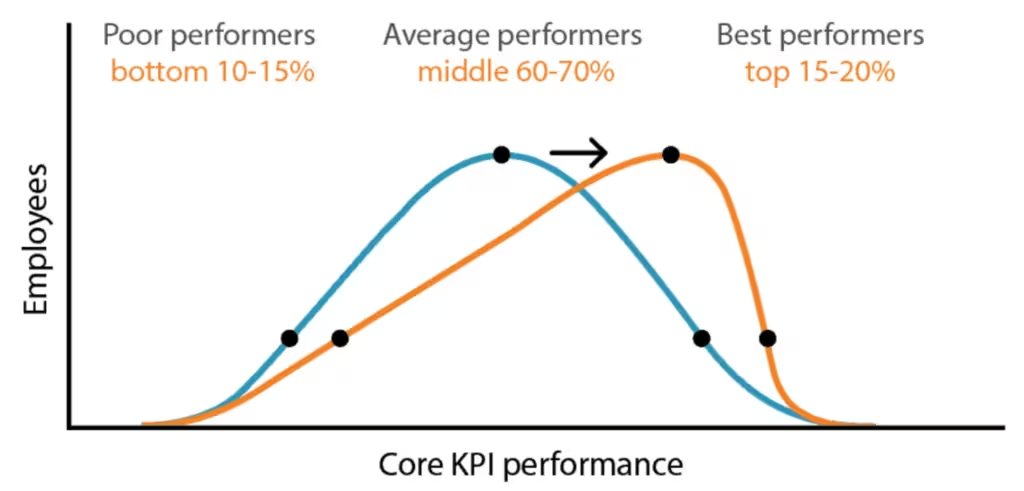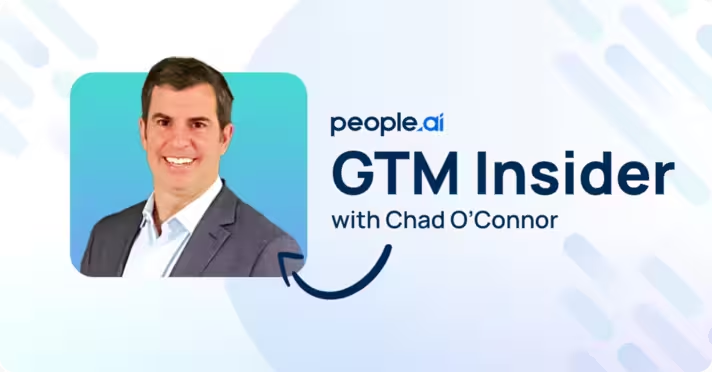Moving the middle 60-70% of your sales team — your core, average performers — is the best way to maximize overall organizational performance. Typically, bottom performers are there due to motivational or job-fit issues, and it’s incredibly difficult to squeeze any more revenue from your top-most performers. The middle, or “Core”, is where you can drive the greatest impact on your top and bottom line.

But how do you figure out what to move and how?
In the past, Sales Operations leaders could really only use rep quota attainment and bookings to see how well they were performing. However, this would not actually tell you how certain reps were driving more bookings versus less. With People.ai data, however, Sales Managers and leaders gain visibility, at a granular level, as to how hard people are working and what behaviors are truly driving higher performance in order to optimize coaching and enablement programs.
The key to doing this is to focus on activity-level data.
Behaviors of high performers can be isolated into activities. Then you focus on what type of activities (e.g., emails, phone calls, conference calls, and meetings) they do and the timing within the sales year or quarter. This data answers:
- What is the engagement cadence of high performers with their opportunities?
- What activities are the most efficient to driving deals to close at a rep level?
- What activities are most effective in driving more won versus lost opportunities?
- Who do high performers target from a buyer persona perspective that differs from others?
Without granular and well-correlated data behind these questions, reps will be guessing (and often missing the mark) on how they should be focusing their time and effort.
So, how do you move the middle?
First, it’s important to understand who you should be modeling behavior off of from a performance perspective. Attainment offers the truest measure of performance, as it takes into account things like ramp, target accounts and segmentation. Benchmarking on attainment is usually based on the top 20% of quota attainment — these are your “high performers”. This benchmarking shows you how efficiently reps are attaining their quota, or not, as well as what differentiates them from low performers.

For example, high and low performers might spend the same amount of time on in-person meetings, but high performers focus this time at the beginning and end of the year to open and close deals, whereas low performers’ use of in-person meetings is more random throughout the fiscal year.

High performers bridge the gap between these in-person meetings with conference calls to stay engaged with customers throughout the year, whereas low performers might use emails instead, leading to less engagement with and from the customer. So, while emails are high-value activities and necessary to book in-person meetings and conference calls, the delta between the number of these activities and when they occur throughout the year are key drivers of performance.
Activity-based profiles for high performers differ by segment, product, industry, region and many other key variables within and across companies.
Therefore, a high performing rep activity profile for the commercial segment of a company may be the same as a low performing activity profile in the enterprise segment. These optimal performance activity profiles should be created for each meaningful sales motion a company has, and should be used for coaching and goal-setting focused on the middle 60-70% of reps based on performance. These activity-based coaching and enablement programs then turn into repeatable strategies for each unique role and motion within the sales organization.

People.ai gives you the data you need.
People.ai gives leaders in Sales Ops, Sales Enablement and Sales Management the data they need to analyze the activities of high performers by segment, industry, product, deal size, region, role, etc. The more specific the segmentation of the sales motion, the more actionable and impactful the results will be.
For example, when a People.ai customer analyzed one segment and product motion by region, they found in-person meetings are the single largest determinant of success in EMEA, while their US-based business sees their high performers booking significantly more conference calls.
Ultimately, when a Sales Organization focuses on ‘moving the middle’ through activity-based playbooks and goals, they will see a market improvement across the entire org, instead of focusing on just the top or bottom.
At People.ai, we’ve found that it takes 45-90 days to turn activities into behaviors, but once they do, customers start to see their win rates improve in as little as one deal cycle as a result of mass coordination around the right activities at the right time.
Organizations are also using this data to make better decisions around who to promote or move-out, and how best to hire based on fit for individuals in certain roles, based on the activities that will make them successful. This creates top to bottom sales process optimization at the activity-level, and incentivizes the sales reps for the right behaviors.
People.ai automatically layers on and analyzes buyer path data as well, in order to provide insight into whom to target by each sales motion, as well as which activities will resonate most with them. This all becomes easily coachable using the People.ai platform, and we also lean on the sales ops and strategy backgrounds within our Customer Success organization to create crisp playbooks for our customers to optimize their reps’ time by driving the right activity, at the right time, targeting the right persona.
What does this look like?
Using People.ai data, one customer recently found that if they bring a Sales Engineer to one of their first three meetings, it leads to more technical buyers from their target being brought in early, and increases their win rate and average deal size immensely. By looking at deals holistically, People.ai enables customers to understand why some deals stall, while others succeed, and distill these activities into plays and coaching, leading to increased stage conversion, and overall, win rates.
People.ai analyzes the data for you and works with you to create a playbook unique to your organization.
Related Insights
Explore more expert insights on AI adoption, sales execution, and revenue intelligence to help your team close more deals with confidence.



